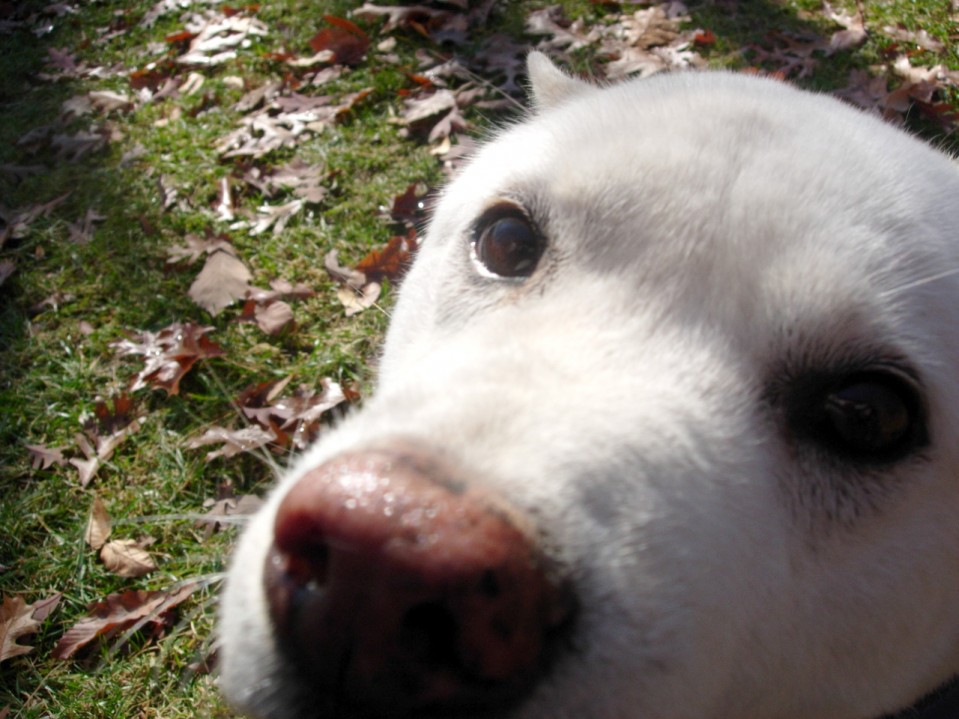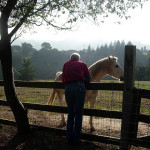Throughout the course of my life, I’ve been fortunate to have had the companionship of many wonderful dogs. During my middle school days, my parents adopted an Australian Shepherd puppy that my brother named Elle after the object of his schoolboy crush (the Australian supermodel Elle MacPherson). I remember we were infatuated with this cute and cuddly puppy, but we were too young to take real responsibility for her so she was eventually taken in by an older couple in the neighborhood.
After my brother and I left home for college, my parents filled their empty nest by adopting a rascally brother-and-sister duo named Boknami and Boksiri (which translates to “Happy Boy” and “Happy Girl” in Korean), two chestnut-colored Jindo dogs.
Then there was Donut, a Frisbee-and-rubber ball-obsessed black Labrador an ex-boyfriend and I adopted from a shelter in New York City (but who was later re-homed after our subsequent split.) And now my husband and I currently share our home in Oakland with a male-and-female pair of 3-year-old Shiba Inu rescues, Uni and Iko, who bring both joy and chaos to our lives.
And while I’m fond of all of these dogs, if I had to choose a favorite, it would have to be Mandoo. About ten years ago, back when I still lived in New York City, an on-again, off-again relationship that I thought was finally showing some promise abruptly detonated and left me feeling quite fragile. I sought refuge from my pain by living nomadically for weeks on end by camping out on my friends’ couches.
After a prolonged period of depression and listlessness, I decided the solution to my problem was to adopt a dog as soon as possible. My friend Mickey warned me that this was the worst idea in the world. “You’re just replacing your ex-boyfriend with a dog. You should wait until you have a clearer head and not act like a 5-year-old who wants a teddy bear.” I rationalized my decision by thinking this would be an unselfish act (giving a stray dog a home), although this was partially a ploy to disguise my own selfish longings (needing large quantities of unrequited love.)
I started to obsessively peruse Petfinder.com. Searching for a dog online feels rather like online dating, except that you’re reading about whether your prospective partner gets along with cats and small children or has separation anxiety. In order to narrow my search, I limited my query to Jindo dogs, just like the Korean breed that my parents owned. There were never very many available in the greater New York City area, and the few that seemed to turn up tended to be on the older end of the age spectrum. I wanted a younger dog that could share my active lifestyle. We could have picnics together at Central Park, or run around on Rockaway Beach and stroll across the Brooklyn Bridge at night. I wanted the maudlin New York City love story that I would never have with my ex-boyfriend. He would be my loyal friend, my own personal Rin-Tin-Tin or Lassie, a devoted dog that would help heal my broken heart.
One day, a white Jindo male popped up in my search: Xander. The small, private shelter in Queens that housed him estimated him to be approximately 2 to 3 years old. According to his profile, he had no apparent personality flaws either. Xander’s only history was that he had been found wandering around a golf course with no tags or other identifying information.
That same weekend, I took a subway trip out to the shelter which was housed in the back of a tiny, cramped pet store. The volunteer who met me and helped to manage the animals was an older, retired lawyer in rumpled clothing with a fondness for the television series “Buffy the Vampire Slayer”; all of the rescues were named after characters in the show. “That’s Buffy the cat. And there’s Willow. And there’s another Buffy.” (I guess there were bound to be some repeats in the bunch, given that there’s only so many characters in a show.)
As I followed him to the back of the shop, all of the animals started barking, howling and meowing in unison. Xander’s cage was located towards the end of the aisle in the bottom row. He was curled up in the corner, retreating away from all of the noise, but Xander immediately sprang to life when he realized he was going to be let out of his cage. The volunteer opened his door and put him on a leash. He was pretty pathetic looking — extremely thin with matted fur, with the nervous energy of a prisoner being set free — but I was won over immediately. Here was a dog needier than I was at the time, and I was always a sucker for broken souls.
As Mandoo came up to me and sniffed my hand, the volunteer said, “That’s surprising — he took to you right away. Normally he’s a little on the shy side.” I took him for a walk around the block, and he forcefully pulled his way forward, sniffing every inch of the sidewalk with his nose. After we returned back to the shop, I told the volunteer I was taking him home. I already had a new name for him — Mandoo — which means “dumpling” in Korean.
As with many relationships, the first few honeymoon weeks with Mandoo were blissful. Living in the shelter had made his stomach skittish towards most foods, so I put him on a raw food diet. He began to put on weight, and his fur started to look glossier. Mandoo and I would go rollerblading together along the West Side Highway’s multi-use path, and he’d tow me along as we traveled to dog parks from the West Village all the way up to the Upper West Side. He was the perfect distraction. My heartache began to diminish as I focused all of my energy on taking care of Mandoo. The rewards for looking after him were many: having him jump up-and-down and whimper loudly whenever I came home from work; accompanying me on my long, meandering walks; snuggling at the foot of my bed at night. That dark loneliness I felt months prior began to slip away.
But after about a month, the first signs of drama began to appear. While Mandoo adored me from the get-go, he refused to let anyone else pet him. My roommate Maya could barely get near him and she’d have to give him a fairly wide berth when moving around in our apartment. During one visit from my parents, he snapped at my dad’s hand when he tried to pat Mandoo’s head.
Then Mandoo started aggressively going after any small dogs that he’d see during our outings and dog parks soon became off-limits. One time, as we rollerbladed down the West Side Highway path, he lunged at a dog that was jogging past us. The other dog’s owner tried to kick Mandoo, and I got in a screaming match with him before he stormed off in disgust. I left feeling defensive and ashamed — and the realization that Mandoo had real problems.
But I didn’t want to give up on Mandoo. I consulted a trainer, and she told me that some rescue dogs act on their best behavior in the beginning stages of an adoption since they want to stay in their new home. But once they get comfortable in their surroundings, their true colors begin to show. As more time passed, Mandoo started to seem like a prisoner in our apartment. It wasn’t safe to walk him down the street unless he had a muzzle on since the streets of New York were always filled with dogs. I’d walk him early in the mornings or late at night to avoid any scenes.
He did make some progress. Once, when I went out of town for a short trip, I entrusted him in the care of my best friend Ben. Mandoo immediately slipped out of his collar and ran across Eighth Avenue, somehow managing to avoid getting hit by any of the rush-hour traffic. I had to go back and retrieve him and help get him to Ben’s place. But once Mandoo realized he was there for the weekend, he slowly warmed up to Ben and eventually welcomed him into his small circle of trust.
Mandoo eventually befriended my roommate, too. In the summertime, Maya would let him up on our rooftop to enjoy the sun while I was at work. One of our neighbors apparently disapproved of this and let him out into the street one afternoon. I received a frantic phone call from her at work and I spent the rest of the day desperately plastering the surrounding area with flyers. I received a number of calls from people who’d spotted Mandoo, but no one was able catch him. He finally came back on his own early in the morning, and a woman who spotted him out in front of our building managed to get him inside with the help of our super. The super put him back on the roof since it was 4AM and he didn’t want to wake us. When I checked my phone in the morning, I saw that he had called and left a message about Mandoo’s return. As soon as I stepped outside of our apartment, I heard his familiar whimper coming from upstairs. I was never so relieved as when I opened the door to the roof and Mandoo came running into my arms. Dirty and tired from his prolonged and panicked travels, Mandoo quickly collapsed on the floor into an exhausted, deep sleep as soon as he set foot into our place.
And so we had our good days and our bad days. In time, I eventually felt ready to be in a relationship again and met someone new. I moved into my boyfriend’s place in Brooklyn. Mandoo adjusted well to his new co-owner and as there were very few dogs in the area, I could take him out more often into the neighborhood during regular hours.
One summer afternoon, we took Mandoo along with us to Long Island for the weekend to relax at the beach with friends. We chose a more remote spot at the edge of the beach, and I didn’t see any other dogs in the near vicinity. While my friends began to play cards, I settled down onto my blanket with a magazine and looped his leash around my wrist. All of sudden, Mandoo jerked away from me and tore down the beach towards the ocean. He had spotted a small dog and proceeded to attack it, shaking it furiously back and forth in his mouth. My friends and I separated them quickly, but the dog’s owner was understandably hysterical. I took Mandoo back to the car, utterly demoralized by my careless mistake. So many weeks had passed without incident, and I had grown foolishly complacent about Mandoo’s temperament. We were both fortunate when the owner called later on and reported that the dog was completely fine.
After this incident, I was pretty conflicted about what to do. It was exhausting being so vigilant all the time and caring for Mandoo began to put a strain on my relationship as my new boyfriend wasn’t as patient with his behavior. I contacted his former shelter and let them know about his ongoing issues. It was then that they disclosed that I was his third owner and that his previous adoptions had failed for similar reasons. I had to be his last owner or they’d take him to an animal sanctuary.
While I felt somewhat betrayed upon learning his full troubled history, I also felt more compassion for Mandoo. He’d been through so much and I felt truly indebted to him; I believed that he had helped me to regain my sense of self. Knowing the conditions of his previous residence, I was loathe to give him up unless I knew he could be re-homed successfully in a place that was peaceful. The shelter offered to pay for a behaviorist and we dutifully went through training sessions for several months. But the problems continued unabated and I was at a loss as to what to do.
My parents were coincidentally going through their own tribulations with Happy Boy and Happy Girl, who weren’t getting along with their irascible neighbors’ yappy little white poodle. Happy Girl nipped at the poodle one day during a walk, and although the poodle was unharmed in any way, the neighbors brought a lawsuit against my parents saying that their dogs should be kept within the confines of their property. Rather than live next to these litigious jerks, they decided to relocate and bought a small cabin deep in the woods of Georgia. It had a large fenced-in yard that would be perfect for their Jindos — and it turned out, Mandoo.
Mandoo and I took a 14-hour road trip from New York City down to Georgia. When we arrived, I could tell he loved the woods and exploring the trails that dotted my parents’ property. But I felt he knew that I was leaving him when I said goodbye a week later. He apparently looked for me for days after I returned to the city. My mom said he’d watch the driveway, seeing if my car would pull in and look disappointed when he saw it was my dad and wasn’t me. His appetite faded for several weeks. But I knew he’d eventually be happy in his new home that was surrounded by nature and away from the stress of urban life. My first visit back was Thanksgiving later that year, and I wondered whether he’d remember me. But as soon I walked up onto the porch, there he was jumping up-and-down, his familiar whimper welcoming my arrival.







